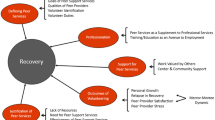Abstract
This study illustrates a monitoring system for peer support programs, focusing on Vet-to-Vet, a program for veterans with chronic psychiatric disorders. The sample consisted of 1,847 anonymous surveys from 38 veteran peer support programs. Program satisfaction and recovery orientation were positively associated with duration and frequency of participation in peer support. Program satisfaction was also associated with the Vet-to-Vet model and location at a VA medical center (vs. other model & location types). Payment for peer facilitators was positively associated with recovery orientation, spirituality, and engagement in meaningful activity. Additional research using experimental design methods is needed to determine the impact of peer support on mental health outcomes.
Similar content being viewed by others
References
Burti, L., Amaddeo, F., Ambrosi, M., Bonetto, C., Christofalo, D., Ruggeri M., et al. (2005). Does additional care provided by a consumer self-help group improve psychiatric outcome? A study in an Italian community-based psychiatric service. Community Mental Health Journal, 41(6), 705–718.
Campbell, S. M., Roland, M. O., & Buetow, S. A. (2000). Defining quality of care. Social Science & Medicine, 51, 1611–1625.
Chinman, M. (2002). Service providers’ views of psychiatric mutual support groups. Journal of Community Psychology, 30(4), 349–366.
Corrigan, P. W., Calabrese, J. D., Diwan, S. E., Keogh, C. B., Keck, L., & Mussey, C. (2002). Some recovery processes in mutual-help groups for persons with mental illness; I: Qualitative analysis of program materials and testimonies. Community Mental Health Journal, 38(4), 287.
Corrigan, P. W., Slopen, N., Gracia, G., Phelan, S., Keogh, C. B., & Keck, L. (2005). Some recovery processes in mutual-help groups for persons with mental illness; II: Qualitative analysis of participant interviews. Community Mental Health Journal, 41(6), 721–735.
Kurtz, L. F. (1997). Self-help and support groups: A handbook for practitioners. Thousand Oaks, CA: Sage Publications.
Mead, S., Hilton, D., & Curtis, L. (2001). Peer support: A theoretical perspective. Psychiatric Rehabilitation Journal, 25(2), 134–141.
Min, S. Y., Whitecraft, J., Rothbard, A. B., & Salzer, M. S. (2007). Peer support for persons with co-occurring disorders and community tenure: A survival analysis. Psychiatric Rehabilitation Journal, 30(3), 207–213.
Proceeds of the Mutual Learning: A VA Peer Support & Education Conference. (2005). Available online: http://www.veteranrecovery.org/announce/Suggested_Practices_from_Conference.htm.
Resnick, S. G., Armstrong, M., Sperrazza, M., Harkness, L., & Rosenheck, R. A. (2004a). A model of consumer–provider partnership: Vet-to-Vet. Psychiatric Rehabilitation Journal, 28(2), 185–187.
Resnick, S. G., Fontana, A., Lehman, A. F., & Rosenheck, R. A. (2005). An empirical conceptualization of the recovery orientation. Schizophrenia Research, 75, 119–128.
Resnick, S. G., & Rosenheck, R. A. (2006). Recovery and positive psychology: Parallel themes and potential synergies. Psychiatric Services, 57(1), 120–122.
Resnick, S. G., Rosenheck, R. A., & Lehman, A. F. (2004b). An exploratory analysis of correlates of recovery. Psychiatric Services, 55(5), 540–547.
Rosenheck, R. A., Wilson, N., & Meterko, M. (1997). Consumer satisfaction with inpatient mental health treatment: Influence of patient and hospital factors. Psychiatric Services, 48, 1553.
Scheid, T., & Greenley, J. R. (1997). Evaluations of organizational effectiveness in mental health programs. Journal of Health and Social Behavior, 38, 403–426.
Seligman, M. E. P., & Csikszentmihalyi, M. (2000). Positive psychology. American Psychologist, 55(1), 5–14.
Sheldon, K. M., & King, L. (2001). Why positive psychology is necessary. American Psychologist, 56(3), 216–217.
Shepherd, M. D., Schoenberg, M., Slavich, S., Wituk, S., Warren, M., & Meissen, G. (1999). Continuum of professional involvement in self-help groups. Journal of Community Psychology, 27(1), 39–53.
Stewart, M. J. (1990). Professional interface with mutual-aid self-help groups: A review. Social Science & Medicine, 31(10), 1143–1158.
Underwood, L. G., & Teresi, J. A. (2002). The daily spiritual experience scale: Development, theoretical description, reliability, exploratory factor analysis, and preliminary construct validity using health-related data. Annals of Behavioral Medicine, 24(1), 22–33.
Author information
Authors and Affiliations
Corresponding author
Rights and permissions
About this article
Cite this article
Barber, J.A., Rosenheck, R.A., Armstrong, M. et al. Monitoring the Dissemination of Peer Support in the VA Healthcare System. Community Ment Health J 44, 433–441 (2008). https://doi.org/10.1007/s10597-008-9146-7
Received:
Accepted:
Published:
Issue Date:
DOI: https://doi.org/10.1007/s10597-008-9146-7




